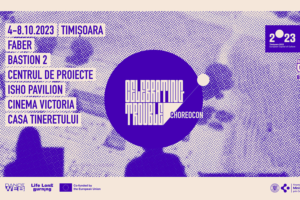On Friday, 17.01.2020 and Saturday, 18.01.2020, we are delighted to announce the premiere of “MONUMENT 0.8: Manifestations” at Kaaitheater in the context of Europalia Romania. With a collage of feminist voices, artistic gestures, historical avant-garde, and traditional songs performed by Salka Ardal Rosengren, Madalina Dan, Flavia Giurgiu, Judith State and Ayșe Orhon, Eszter Salamon focuses on Romanian histories, in a special setting created by artist Marilena Preda Sanc that covers the entire stage.
MONUMENT 0.8: Manifestations is a performative, visual and sound collage that animates an emancipatory space by interweaving traces of the Romanian history of feminism, artistic gestures and female perspectives in the history of painting and traditional music. This choral performance destabilizes not only dominant views on history, but also borders that were built to separate artistic expressions, cultures, nations and identities. As the piece carves out a trans-historical and trans-disciplinary space of memory, a new ecology of relationality appears through a hybrid fabric of political and choreographic movements, creating a new poetic matrix.
Performance art has always sought to unite art and life. How and why is it important to address the marginalized history of feminism in the Romanian and Eastern European context – on the periphery of our collective historical consciousness?
Eszter Salamon is a Hungarian choreographer, artist, and performer who lives and works in Berlin, Paris, and Brussels. Salamon uses choreography to build bridges between media such as image, sound, music, text, voice, and bodily movements. Her creations are often based on particular issues such as hidden power structures sustaining the hierarchical systems of artistic and educational economies of productions. Another field of investigation in Salamon’s work is the relationship between voice, language and movement. Her work has been presented at museums including Centre Pompidou (FR) and MoMA (USA), and events like Holland Festival.
Integrating the traditional forms of art and the new media arts, her art works visualize and investigate the body / mind / soul / behavior in relation to nature and social / political and representational space. Her art work explores the feminism problematic as gender / ageism and woman as leader in an eco-feminism key.
She exhibited her art work in many national and international exhibitions, festivals and took part in residencies (Kulturkontakt Vienna, Franklin Furnace, N.Y.). Her videos, paintings, drawings, installations, interventions on photography are in museums or private collections such as: The National Museum of Contemporary Art, Bucharest MNAC; Arhitekturni Muzej Ljubljana; Kunsthalle, Nürnberg; Albertina Art Collections, Vienna.


